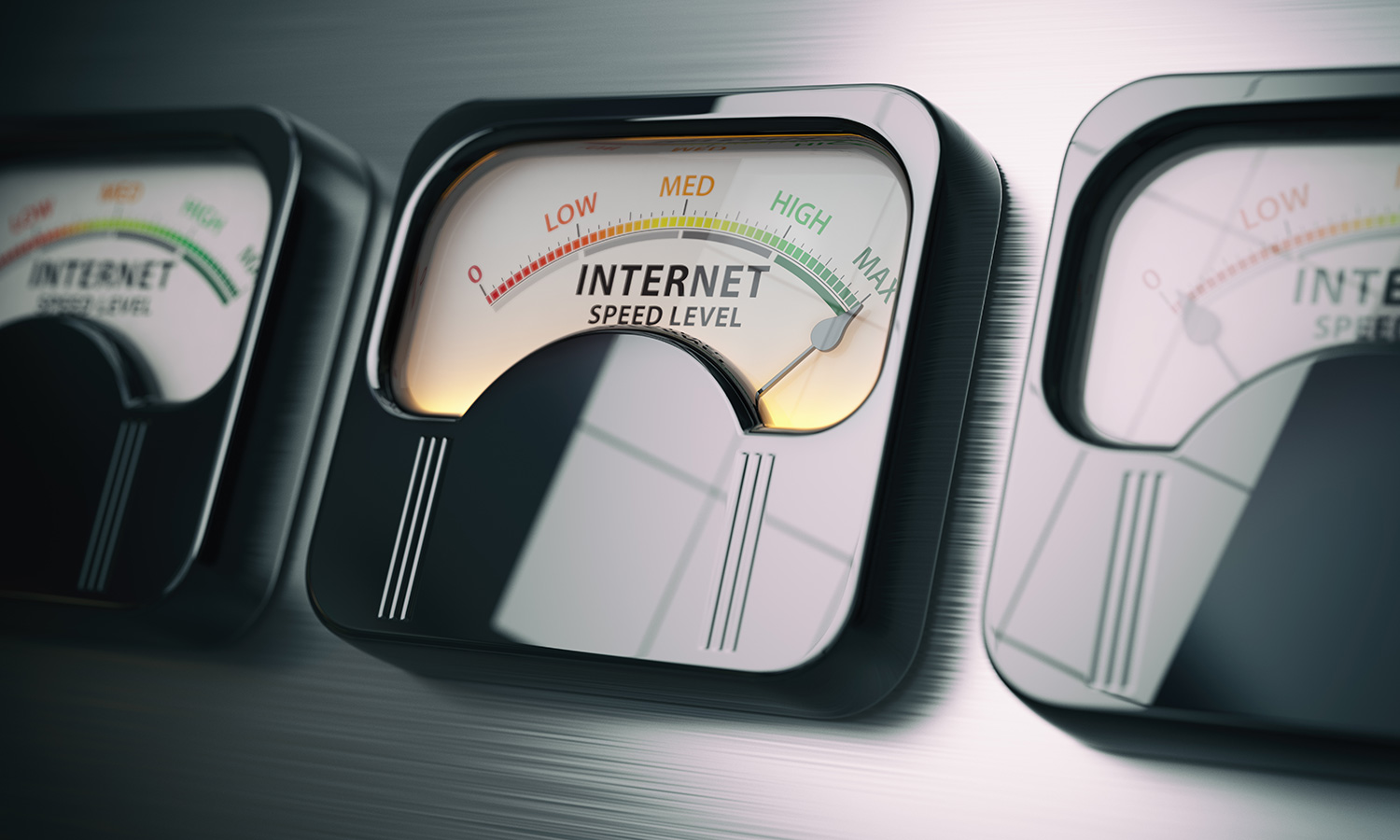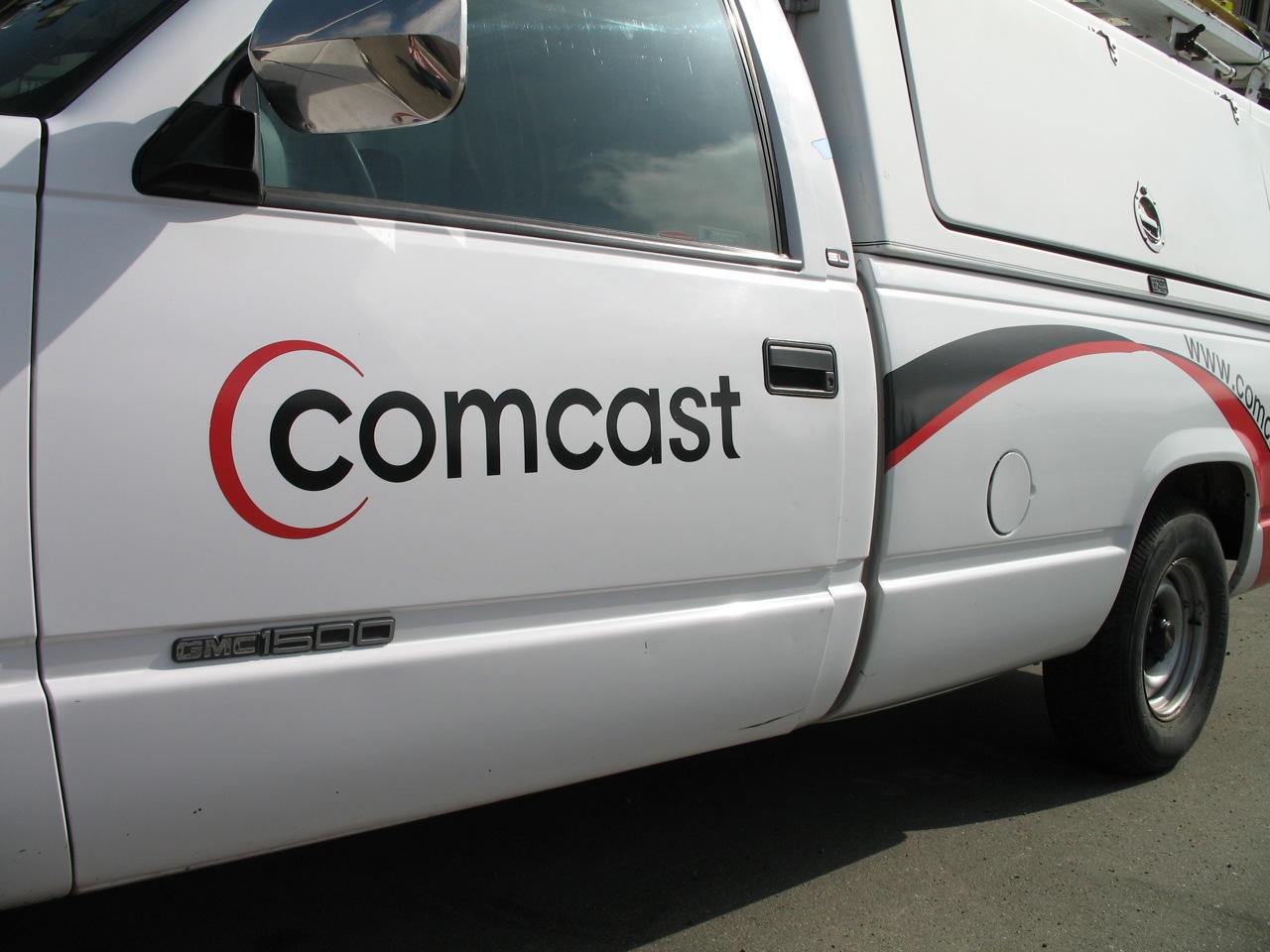Should I Upload My License on Internet
What internet speed do I need? Here's how many Mbps is enough

How much internet speed do I need? You may ask yourself this question every time comes fourth dimension to renew your internet service plan, if non every time you pay your bill.
Knowing which broadband service plan is correct for yous and your household isn't the simplest question to answer. The COVID-19 pandemic put more demand on home networks than always, with your habitation broadband program having to serve as a work resources and a schoolhouse service on top of your usual streaming and gaming.
Hither'due south how to know if you're paying too much for your net access — or if you're actually getting the service you demand. (Having one of the best cable modems or all-time Wi-Fi routers will help also.)
Internet connectivity is something of a moving target. The number of connected devices and users in our homes is growing chop-chop, and those devices are accessing the cyberspace more and more.
Sometimes, you may be enjoy blazing speeds on your laptop, telephone or tablet, and at other times, you wonder why your connexion is so deadening. Maybe your game stalls when someone else in the house starts streaming music. Or maybe your Roku set-top box keeps buffering just as you're getting to the best function of a movie on Netflix.
Tom's Guide asked broadband experts and staffers at net service providers (ISPs) to see if you lot really need to pay a lot more for faster connectivity. Here's what we establish.
What net speed do I need? Quick tips
- Netflix says you need 5 Mbps to stream full HD content and a data rate of 25 Mbps (megabits per second) for 4K Ultra HD content, but you lot'll want even faster speeds if you plan to connect several devices at in one case. The same holds true for other streaming services too as game-streaming services similar Twitch.
- Multiple devices need more bandwidth. If you're planning to stream 4K video content and accept multiple devices connecting to your network simultaneously, you should seriously consider investing in plans that can provide faster download speeds, such equally 200 Mbps. That speed should piece of work for even the nigh data-hungry households.
- Consider gigabit (one,000 Mbps) speeds, if available. Serious data-hogs will desire faster speeds and more than bandwidth. If they're bachelor, gigabit-speed net plans are the best yous can get for dwelling house connections.
- Know your speeds. Apply i of the best speed-examination apps to bank check your internet connexion speed and determine whether you're really getting the bandwidth y'all're paying for.
- Cheque your Wi-Fi connection. Sometimes the problem is with your home network and not your ISP. Come across our guide on how to make Wi-Fi faster for some quick tips.
There is such a thing as besides much speed
I know, I know — all the ISPs are telling y'all to go a faster (and more expensive) plan. But yous may be paying more you demand to.
"To select the all-time services or parcel for your usage, you must understand your bandwidth needs," said Lincoln Lavoie, a senior engineer of broadband technologies at the University of New Hampshire InterOperability Laboratory.
"This [bandwidth] depends more on the applications being used (streaming is largely a downstream application), but as users first doing more things like video calls and movie sharing, upload also becomes very important," Lavoie told Tom's Guide.
"Similarly, upload speeds are critical for people working remotely from home, as upload speeds would impact things like screen sharing and online conference calls."
Later on ii years of pandemic-related lockdowns, during which people accept handled everything from work to schoolhouse right from dwelling house, having sufficient bandwidth for the whole family is more than important than always.

A senior engineer who works at a well-known ISP (and spoke to Tom's Guide on condition of anonymity) echoed that point, saying internet speeds ultimately depend on what the customer is doing with his or her internet connection.
The engineer added that the "average family" shouldn't pay for "anything beyond 20 10 5" — in other words, 20 Mpbs for each of up to v data-hungry devices such every bit laptops, gaming consoles and streaming TVs.
Companies similar Spectrum are offer 100Mbps download speeds equally a baseline, so that kind of plan should work exceedingly well for most people.
How many Mbps practise you really need?
| Number of devices | Use Cases | Recommended Download Speed |
| 1-ii | Web surfing, electronic mail, social networking, moderate video | Upwards to 25 Mbps |
| 3-5 | Online multiplayer gaming, 4K streaming | 50 - 100 Mbps |
| More than v | All of the above plus sharing large files and alive streaming video. | 150 to 200 Mbps |
Another broadband expert told Tom's Guide that the more bandwidth you have, the better — merely only upwardly to a bespeak.
Christopher Mitchell, director of the Community Broadband Networks Initiative at the Institute for Local Self-Reliance in Minneapolis, said a fast data rate will ensure you take enough bandwidth when you actually demand information technology — for example, if you have a big file to upload or you're doing sophisticated piece of work on your network.
As indicated by the proper name, gigabit speed offers 1,000 Mbps, or 1 Gbps, an exponential increase over the 20-to-200 Mbps plans that are mostly considered loftier-speed broadband. See our article What is Gig-Speed Internet? for a full exploration of what gigabit internet plans offer, what they cost and what they allow you to do.
However, "anything over x Gbps to a home user is pretty likely overkill," Mitchell said. "Merely a few networks in the U.S. do 10 Gbps. A gig everywhere should exist a goal — not because people will max it out, but because it will ensure everyone can do what they want without worrying almost the network being the bottleneck."
As more people shift to streaming for their Television set and movie-watching needs, bandwidth requirements become a bigger issue. If you desire to stream 4K content to become the best movie for your 4K smart Goggle box, y'all'll demand a connexion of at least 25 Mbps. Lower-resolution content is less demanding, but even streaming 1080p HD video will require a x Mbps plan for smooth performance.
That's assuming you only stream video to one device at a time. If there's more than ane Tv in your home, or you want to watch in the living room while someone else watches on a laptop in the kitchen, then your bandwidth needs will grow accordingly.
Smart-abode devices also bring new demand for bandwidth. Information technology only takes a few devices, like a smart thermostat, a smart speaker and a smart lock, to start having an impact on your home'south connectivity speeds, and so don't forget to factor those into your thinking when you consider how many devices are in use in your dwelling.
Most experts recommend adding an extra 5 Mbps to your plan for every 10 smart-home devices, though some information-intensive products, such as cameras, will crave much more.
The cost of connectivity
Although in that location's a debate over how much internet speed the average home client needs, it's clear that ISPs benefit from your want for faster internet speed. The ISPs tin also provide some insight into how much speed y'all really need by listing how many devices can connect to the network at any given fourth dimension.
According to a report by the The Internet & Television set Clan, the boilerplate American household pays $61 per month for internet service, simply your costs volition vary based on your program and usage.
Comcast Xfinity, a prominent Internet access provider in the U.Southward., has varying prices based on speed. If you listen to the higher up engineer, you can probably get away with the company'due south cheapest parcel, which offers download speeds of upward to 100 Mbps.
The plan is available for new customers at $40 per month and, according to Xfinity, should be able to accommodate up to five devices simultaneously connecting to the internet.

Xfinity as well delivers a connection with up to 200-Mbps download speeds for $55 per calendar month. According to the visitor, that should exist plenty to suit up to 8 devices simultaneously connecting to the internet.
There's fifty-fifty a 2-Gbps Xfinity plan for $300 per month with a two-year understanding. "Unlimited devices" should be able to connect to the web at that speed, the company says. Merely if y'all desire more speed and a little less cost, consider Xfinity's i-Gbps option that starts at $80 per month.
Beware of these pitfalls
In many cases, choosing your net connection speed means weighing how much you're hoping to get versus how much you're willing to pay. But you need to exist fix for the possibility that you won't become what yous want.
Most ISPs offering internet packages with an important caveat: "up to." In other words, for the boilerplate residential net customer, ISPs aren't guaranteeing a certain download or upload speed. So, if you're paying for a 25-Mbps package, you may get that speed (if not more) at times. Merely it'southward as well possible that you'll get less.
Even if your ISP is delivering the speeds you want, the number of devices simultaneously connecting to your network could give you some trouble that could ultimately slow downwards your connection. With everything from laptops and smartphones to TVs and connected appliances relying on a steady stream of data, it'southward easy to underestimate your needs.
"Internet connections serve households or businesses that have multiple users that each have multiple devices (sometimes more than 10 per person, ultimately)," Mitchell said.
"They create congestion in unexpected means — you may not need a 100-Mbps connection virtually of the 24-hour interval, but when y'all need it, y'all want it there. Much like a car can go 100 mph, but nosotros rarely drive it that way."
How tin can yous tell if your network needs a boost? Lavoie said to await for "quality of feel" metrics, including load times and the frequency of connectivity glitches and connection drop-outs. It's also important to utilise online speed-bank check tools, like the same Fast.com or others, to meet at what speed you start to experience problems.
What about online gaming?
If you're an avid gamer, playing online with friends might be i of the things you relish most. Having fast internet is really important for that.
Over on its support forums, Microsoft offers a handy reference document to help yous know how fast your internet speeds should be to accommodate online play. According to the document, you'll desire a download speed of 3 Mbps or better and an upload speed of 0.5 Mbps or ameliorate. Your ping charge per unit (a measure of the lag your cyberspace connection causes in online gaming) should also be less than 150 milliseconds.
Sony and Nintendo recommend the same speeds.
Twitch and game streaming
When it'south time to stream games between friends on Twitch, you'll need even faster connectivity, according to Microsoft and other game companies. According to Twitch'south broadcasting guidelines, you'll need a bitrate of at least 2.5 to four Mbps to play at 720p and 30 frames per second. It then goes upwards to three.5 to 5 Mbps for 720p at 60 fps.

If you want to stream at 1080p and thirty fps, yous need iii.5 to 5 Mbps besides, and 1080p at 60 fps demands four.v to 6 Mbps.
Are speeds irresolute?
The skilful news is that cyberspace speeds are improving. A 2020 study from internet speed-test company Ookla found that the average download speed increased past 19.half dozen% for fixed home broadband connections between 2019 and 2020.
Gigabit speed connections, in one case limited to specific neighborhoods in only the largest cities, is now more than widely available than e'er. According to the The Cyberspace & Television Association, gigabit service is available to more than eighty% of households in the United States, with gigabit speed connections offered in more 40 states. (See our guide to learn what is gigabit Net.)
How much speed do I have?
Before you lot can make an informed decision about your Internet speed, it'south of import that yous detect out how much speed you're actually getting right now. There are plenty of places to find that out.
Popular tools for measuring net speed include Ookla Speedtest and Netflix'south Fast.com, which y'all tin pull upward on your laptop in whatever spider web browser for complimentary. Even better, you can likewise get dedicated smartphone apps for those same tools, with free apps for both Ookla Speedtest (Android / iOS) and Fast.com (Android / iOS).
There are also similar tools provided by diverse broadband companies, if you lot want to use a tool that's specific to your Cyberspace service provider:
- AT&T
- Cox
- Spectrum
- Verizon
- Xfinity
Regularly checking your connection speeds will not just give you a good idea of whether yous're getting the services you lot pay for, but also how well-suited your connection is for uses like streaming in 4K or online gaming.
What's going on with 5G?
Wireless carriers — including Verizon, AT&T, Sprint and T-Mobile — have already introduced 5G connectivity beyond their networks, and coverage has spread to major cities and markets.
Once 5G speeds come to your area, the mobile technology could requite your current Internet access provider a run for its money. As 5G wireless technology starts to ringlet out beyond the country, there is a push to apply the faster speeds of 5G for in-home broadband, equally well as mobile connectivity.
The potential speeds promised past 5G are an incredible spring forwards, with download speeds ranging from from 150 Mbps to more than than 1 Gbps in some tests. That's an enormous improvement over 4G, which ranges from 30-60 Mbps. That's also fast plenty that yous could conceivably apply a 5G connection to run into all of your home cyberspace needs instead of traditional wired broadband.
However, there'due south notwithstanding a manner to go before 5G in the home becomes a feasible choice. First, 5G service needs to roll out to more than of the country. It'due south offered in some cities, but rural coverage isn't wide spread, and networks are notwithstanding existence congenital out and refined.
The hardware for in-home employ is a lilliputian different, with exterior 5G antennas to pull in the indicate, and 5G-friendly routers then divvying upward the connectedness throughout the home. These products are still in the early days, so don't count on ditching your cablevision simply withal.
There's also the question of price, as most information plans from carriers are yet mobile-oriented, and come with data caps and restrictions that aren't every bit flexible as current fixed broadband. For now, nosotros recommend waiting on switching your whole home to 5G.
Bottom line
Ultimately, deciding on the internet speeds you need isn't as simple as it looks — or as uncomplicated as ISPs want you lot to believe.
According to the experts, you need to think nigh the number of devices that will simultaneously connect to your network and exactly what you want to do with your connectedness.
If it's just streaming and web surfing you're after, you lot probable won't need much. But if yous're looking to stream 4K video, play online games and connect multiple devices, y'all'll need more bandwidth, for which you lot'll take to pay more.
What you pay for may not be what you get. Y'all should periodically analyze your network speeds to see what's happening during slowdown or connectivity loss, also every bit regular usage. If you lot aren't seeing the speeds you're paying for, it may exist time to phone call your internet service provider.
robertsfrasmils54.blogspot.com
Source: https://www.tomsguide.com/us/internet-speed-what-you-need,news-24289.html
0 Response to "Should I Upload My License on Internet"
Post a Comment